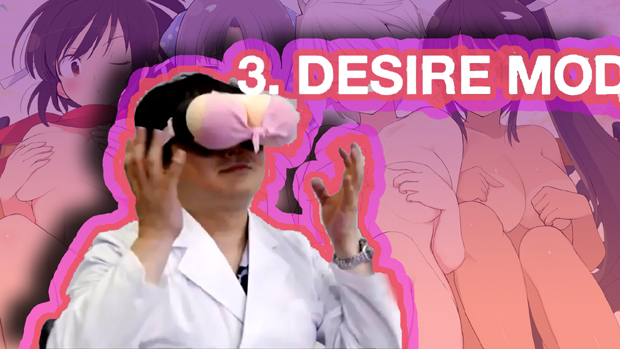Maybe it was inevitable
Last week, Steven Hansen did a news story about some fake boob-infused videogame consoles that Marvelous made up to promote the next Senran Kagura game. I did a video about those videos for our YouTube channel, and it was fun.
While improvising the narration, my first thought was “these VR boob consoles would probably make a fair amount of money if they were real,” but after watching the trailers for those fake boob machines a few times, I started to feel less optimistic in general. The second video in particular, the one about the treadmill console where all gameplay consists of running after a jiggling torso? That’s pretty biting. The underlying theme that gamers are unkempt, unpopular, lonely, horny idiots that can be transformed into mindless zombies by the sight of a mannequin with wobbly tats is an old ugly stereotype that I thought we were done with. It’s self-parody, which I appreciate, but it’s also a bit hostile and deprecating towards gamers in general.
That’s not what made me sad though. Humor that’s a little more mean than they should be isn’t too big of a deal. What made me sad was realizing that if this exact video had come from someone like Anita Sarkeesian, that it would have enraged hundreds of thousands of people. Coming from Marvelous, it’s just a throwaway joke. Coming From Feminist Frequency, it would have been a war cry.

We see this kind of thing in the political arena all the time. Someone from one party says they are for or against something, and extremist members of the other party immediately denounce and insult them, regardless of the issue at hand. It’s dumb and unproductive, but it’s unavoidable when you split something as complex as government policy into a binary “us versus them” organizational system. Most of us know that, but we go along with it anyway because simplifying politics into a two party affair is the only way to get your average person to stop worrying about their day to day problems long enough to focus on what our government may or may not be doing behind closed doors.
Games don’t need that kind of over simplification though. Games don’t have to get support in order to pass new legislation, and neither do YouTube personalities like Anita Sarkeesian and Total Biscuit. Yet if all you knew about gaming came from Twitter or other social media, you may not realize that. Those two figureheads, and many besides them, have loyal supporters that will rally behind their respective “team leader” no matter what they say. That works for great for the content creators at the top, as “voters” on either side of the illusory aisle supply them with views and signal boosting that they can translate into increased clout and/or profit margins. I’m not sure that Total Biscuit or Feminist Frequency would be half as well known at all if it weren’t for the constant fighting that goes on between their respective fans.
But what does all that conflict do for us, the videogame enthusiasts? How does this “two party thinking” help to serve our interests in gaming and discussing gaming with other fans for the medium? Do we benefit from having the loudest, most well known voices also be the most harsh and negative? Do all these bombs being thrown back and forth offer us anything other than distraction and a heightened sense of importance?

Right now there are hundreds of people clamoring about how the new Tropes Vs. Women in Video Games is awful, or great, depending on what “party” they’ve planted themselves in to. It makes me wonder how they would feel if Total Biscuit had made the exact same video, word for word, shot for shot. Would Feminist Frequency fans have praised it? Would Total Biscuit followers have harshly denounced it as “more SJW nonsense?” I kind of doubt it.
When someone becomes a media icon, we lose the ability to see them in detail. They become a representative of broader ideas, and often, of larger conflicts. The conflicts are often fruitless. They’re certainly never going to be settled in 140 characters or less. Even so, we put time into these conflicts that could have been spent on resolving issues in our actual, face to face, living, breathing relationships. I guess it’s easier to bicker with strangers on Twitter than it is to talk to your actual friends and family about your feelings. Why else would people be more drawn to these large, unwinnable conflicts than ever? I’m actually wistful for the old “Sega Vs. Nintendo” debates because compared to a lot of the arguments I see in gaming today, those conversations were actually about games, and they didn’t always lead to people seeing each other as political enemies.
In the end, we all just want to talk about videogames, right? Can’t we join on that common interest and work from there, instead of using our differing perspectives as rallying cries to pile on each other in a revolting displays of one-upmanship and intolerance?
I feel like I’ve probably said all this before, but watching those fake VR boob goggles made me want to say it all again.
Thanks, fake VR boob goggles.


